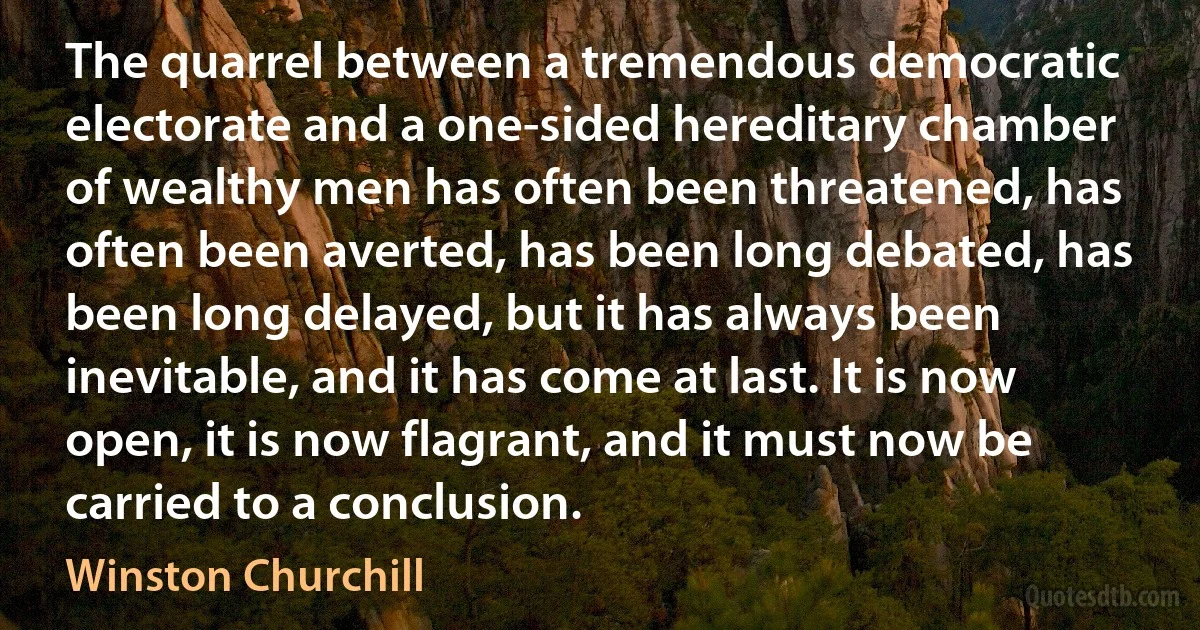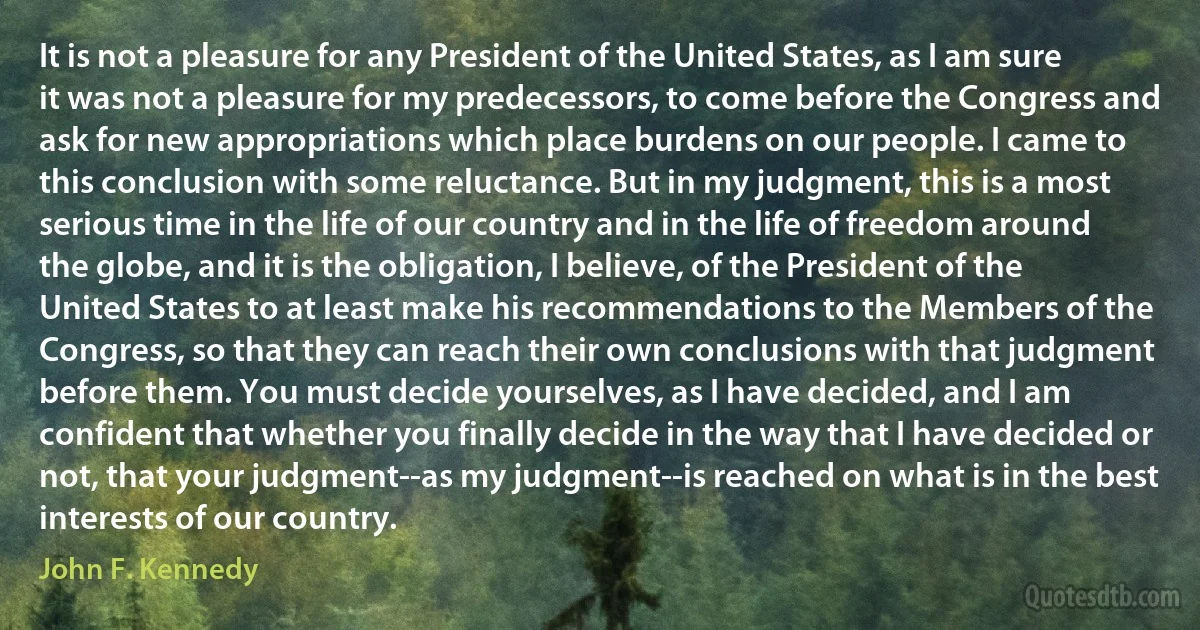Conclusion Quotes - page 15
On September 28 the fleet hove in sight, and all came safely to anchor in Pevensey Bay. There was no opposition to the landing. The local "fyrd" had been called out this year four times already to watch the coast, and having, in true English style, come to the conclusion that the danger was past because it had not yet arrived had gone back to their homes.

Winston Churchill
We can not... escape the conclusion that the rule of reasoning by recurrence is irreducible to the principle of contradiction. ...Neither can this rule come to us from experience... This rule, inaccessible to analytic demonstration and to experience, is the veritable type of the synthetic a priori judgment. On the other hand, we can not think of seeing in it a convention, as in some of the postulates of geometry. ...it is only the affirmation of the power of the mind which knows itself capable of conceiving the indefinite repetition of the same act when once this act is possible. The mind has a direct intuition of this power, and experience can only give occasion for using it and thereby becoming conscious of it.

Henri Poincaré
I had directed drawpipes, connected with the deep well, toward an ordinary star, and the start had faded out four times. There was no mistake about it. Three more people had seen it. There was only one conclusion: The thing we had drawn from was not a star. It was something else; a UFO.

Wilhelm Reich
I have come to the frightening conclusion that I am the decisive element in the classroom. It is my personal approach that creates the climate. It is my daily mood that makes the weather. As a teacher, I possess a tremendous power to make a child's life miserable or joyous. I can be a tool of torture or an instrument of inspiration. I can humiliate or humor, hurt or heal. In all situations, it is my response that decides whether a crisis will be escalated or de-escalated, a child humanized or de-humanized.

Haim Ginott
This leads to the conclusion, it is time to finish retreating. Not one step back! Such should now be our main slogan. ... Henceforth the solid law of discipline for each commander, Red Army soldier, and commissar should be the requirement - not a single step back without order from higher command.

Joseph Stalin
The premisses of demonstrative knowledge must be true, primary, immediate, more knowable than and prior to the conclusion, which is further related to them as effect to cause... The premisses must be the cause of the conclusion, more knowable than it, and prior to it; its causes, since we posses scientific knowledge of a thing only when we know its cause; prior, in order to be causes; antecedently known, this antecedent knowledge being not our mere understanding of the meaning, but knowledge of the fact as well. Now 'prior' and 'more knowable' are ambiguous terms, for there is a difference between what is prior and more knowable in the order of being and what is prior and knowable to man. I mean that objects nearer to sense are prior and more knowable to man; objects without qualification prior and more knowable are those further from sense. Now the most universal causes are furthest from sense and particular causes are nearest to sense, and they are thus exactly opposed to each other.

Aristotle
It would be better, I think, for the man who really seeks the truth not to ask what the poets say; rather, he should first learn the method of finding the scientific premises that I discussed in the second book; then he should train and exercise himself in this method; and when his training is sufficiently advanced, then, as he approaches each particular problem, he should enquire into the premise needed for proving it, which premise he should take from simple sense-perception, which from experience, whether drawn from life or from the arts, which from the truths clearly apprehended by the mind, in order to draw out from them the desired conclusion.

Galen
Velocity of transverse undulations in our hypothetical medium, calculated from the electromagnetic experiments of 'MM'. Kohlrausch and Weber, agrees so exactly with the velocity of light calculated from the optical experiments of M. Fizeau, that we can scarcely avoid the conclusion that light consists in the transverse undulations of the same medium which is the cause of electric and magnetic phenomena.

James Clerk Maxwell
It is not easy for a free community to organise for war. We are not accustomed to listen to experts or prophets. Our strength lies in an ability to improvise. Yet an open mind to untried ideas is also necessary. No-one can say when the end will come. In the war services it is recognised that the best security for an early conclusion is a plan for long endurance.

John Maynard Keynes
In my opinion, condemning the Zionist movement as "nationalistic" is unjustified. Consider the path by which Herzl came to his mission. Initially he had been completely cosmopolitan. But during the Dreyfus trial in Paris he suddenly realized with great clarity how precarious was the situation of the Jews in the western world. And courageously he drew the conclusion that we are discriminated against or murdered not because we are Germans, Frenchmen, Americans, etc. of the "Jewish faith" but simply because we are Jews. Thus already our precarious situation forces us to stand together irrespective of our citizenship.
Zionism gave the German Jews no great protection against annihilation. But it did give the survivors the inner strength to endure the debacle with dignity and without losing their healthy self respect. Keep in mind that perhaps a similar fate could be lying in wait for your children.

Albert Einstein
For sure, even with the best will, the modern person seems generally unable to imagine how large a significance those components of our consciousness rooted in religious beliefs have actually had upon culture, national character, and the organization of life. Nevertheless, it can not be, of course, the intention here to set a one-sided spiritualistic analysis of the causes of culture and history in place of an equally one-sided "materialistic” analysis. Both are equally possible. Historical truth, however, is served equally little if either of these analyses claims to be the conclusion of an investigation rather than its preparatory stage.

Max Weber
Throughout your treatment you forget that you said that 'free-will' can do nothing without grace, and you prove that 'free-will' can do all things without grace! Your inferences and analogies "For if man has lost his freedom, and is forced to serve sin, and cannot will good, what conclusion can more justly be drawn concerning him, than that he sins and wills evil necessarily?

Martin Luther
The one major area of these negotiations where the end is in sight, yet where a fresh start is badly needed, is in a treaty to outlaw nuclear tests. The conclusion of such a treaty, so near and yet so far, would check the spiraling arms race in one of its most dangerous areas. It would place the nuclear powers in a position to deal more effectively with one of the greatest hazards which man faces in 1963, the further spread of nuclear arms. It would increase our security - it would decrease the prospects of war. Surely this goal is sufficiently important to require our steady pursuit, yielding neither to the temptation to give up the whole effort nor the temptation to give up our insistence on vital and responsible safeguards.

John F. Kennedy
In conclusion, let me emphasize one point: that we are determined, as a nation in 1961 that freedom shall survive and succeed--and whatever the peril and set-backs, we have some very large advantages. The first is the simple fact that we are on the side of liberty--and since the beginning of history, and particularly since the end of the Second World War, liberty has been winning out all over the globe. A second great asset is that we are not alone. We have friends and allies all over the world who share our devotion to freedom. [...] A third asset is our desire for peace. It is sincere, and I believe the world knows it. [...] Yet it is important to know that our patience at the bargaining table is nearly inexhaustible, though our credulity is limited-that our hopes for peace are unfailing, while our determination to protect our security is resolute.

John F. Kennedy
The conclusion drawn by ... most of our élites ... is that the population constitutes a deep and dangerous well of ignorance and irrationality; if our civilization is in crisis the fault must lie with the populace which is not rising to the inescapable challenges. And yet civilizations do not collapse because the citizenry are corrupt or lazy or anti-intellectual. These people do not have the power and influence to either lead or destroy. Civilizations collapse when those who have power fail to do their jobs.

John Ralston Saul
This country now possesses the strongest credit in the world. The full consequences of a default or even the serious prospect of default by the United States are impossible to predict and awesome to contemplate. Denigration of the full faith and credit of the United States would have substantial effects on the domestic financial markets and on the value of the dollar in exchange markets. The Nation can ill afford to allow such a result. The risks, the cost, the disruptions, and the incalculable damage lead me to but one conclusion: the Senate must pass this legislation before the Congress adjourns.

Ronald Reagan



